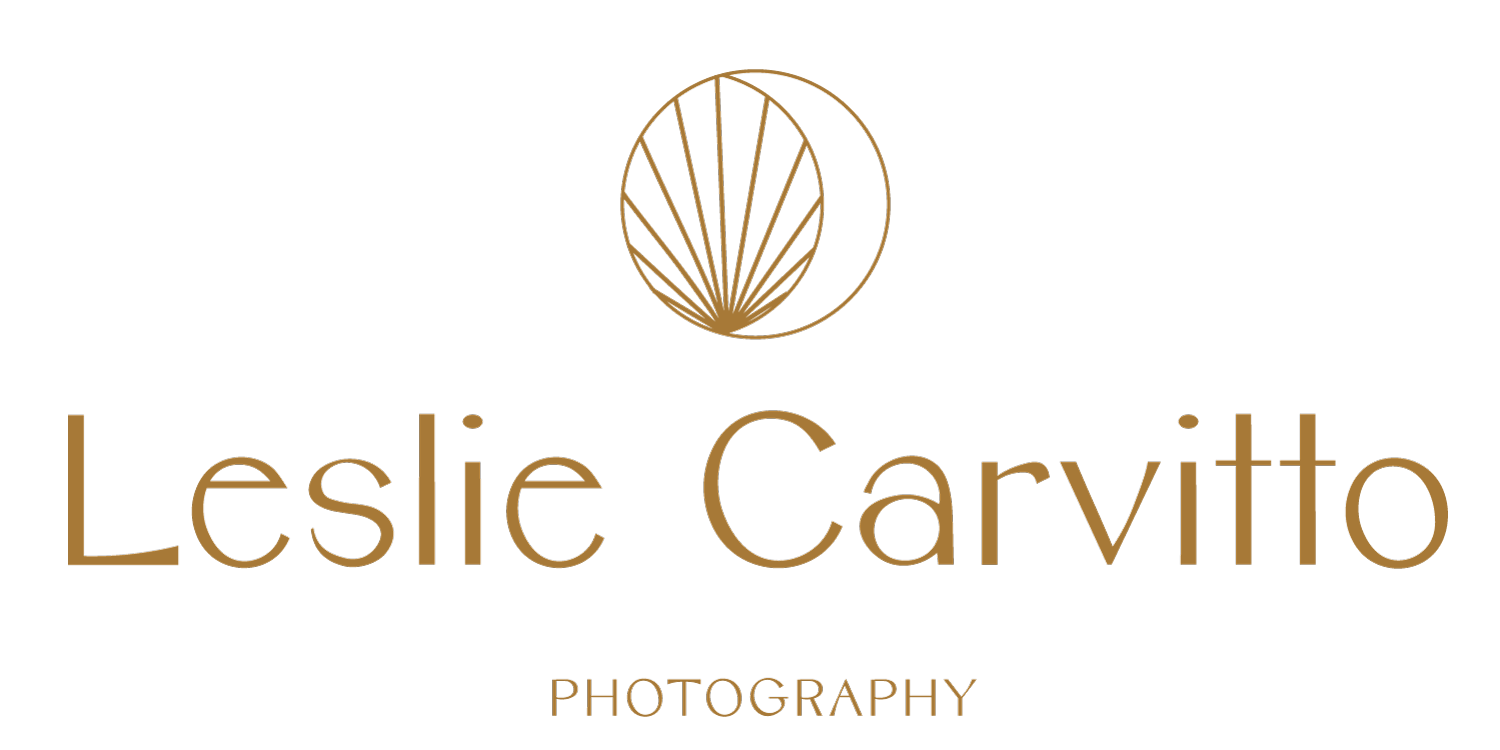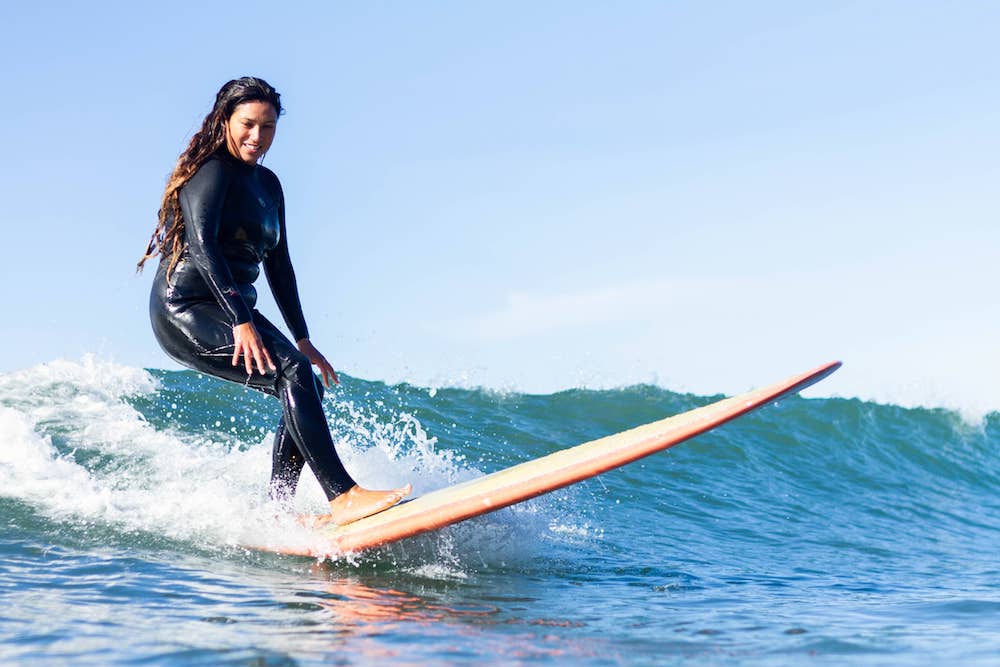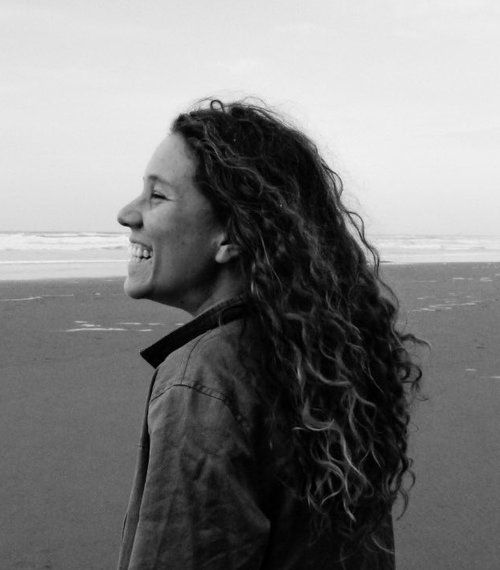Creator's Corner: Sea Together Magazine
Brianna Ortega / Sea Together Magazine
Frustrated by the lack of representation in women’s surfing, Bri Ortega set out to create her own space for water women.
The result is Sea Together, a magazine dedicated to uniting and rewriting women's surfing through creativity and community.
Tell us a little about yourself and your creative background:
Random fact: I’m 26 years old and I’ve moved in and out of 26 houses/apartments in California, Hawai’i, Washington, and Oregon. This has shaped what I create in both my personal life, and in my project, Sea Together Magazine, a platform and magazine to unite and rewrite women’s surfing through art, writing, and community. I’m often the bridge or glue that brings a diverse array of people together. I’m an artist interested in social engagement as a medium, and in facilitating experiences and workshops for participants to connect with themselves and other people more deeply, and to interact with their environment in new and creative ways. I’m currently attending the Art + Social Practice MFA program at PSU.
Photo © Ty Feague | tyfeague.com
How did you come up with the idea for Sea Together Magazine?
I thought about making a women’s surf zine for a few years prior before making the jump in December 2017. I never saw a space for women surfers to come together online, in print, or in real life and it frustrated me. Through working on the project, I realized there were tons of these spaces around the world curated or run by women surfers.
The name was coined with a conversation with Syndey Kay, a surfer from Leucadia. We connected over our serious chronic illnesses via Instagram, and she helped me brainstorm the name. I still didn’t feel fully committed to the name “Sea Together”, but I had to choose something to start the project. I told myself “I’ll just start an Instagram for fun”, and have an online publication. I didn’t even know how to design. Over a month later, my internet friend from Tumblr, Angela Blumen, told me she would design it for free. My cousin Mikaela copy edited the whole ISSUE 001 and my friend Michael helped with copy editing as well.
I never even thought surfers would respond to my little Instagram of 200 followers but they did. Months later, the Kickstarter was fully funded and I shipped the magazines out in July.
Beyond the logistical hard work story, Sea Together is where I want to see all women surfers come together to celebrate our love of the sea, to be seen and heard, to talk about our passions for the environment and surf community. In a world that is so divided right now, I saw it as a space for all women to come together regardless of differences.
The project is an extension of myself. Being left out for most of my life (moving a lot), going through periods of loneliness, being forgotten, being very sick for three years straight, coming from a multi-ethnic blended family, all of these things contributed to my desire to create a space like Sea Together. I have always been a bridge between people, their opinions, their divide, their beliefs, religions, gender, backgrounds, and homes. This project is a bridge between people. A safe space for women surfers. A place for empowerment and coming together.
What are the magazine’s guiding values, and how are they reflected in what you decide to publish and feature?
Sea Together’s values are: authenticity, creativity, vulnerability, diversity, women empowerment, inclusivity, boldness, and environmentalism.
I know that the project isn’t perfect, but I’ve poured out my blood, sweat, and tears to the best of my ability at running a global magazine. I think no project is perfect, but you do all that you can to make it your best, and to help it evolve and be better. I would like people to know that I am only one person running the project.
What’s your favorite aspect of the Sea Together community?
“It’s not just about coming together, but also being inspired and believing that you have a space, you have a voice, and you can go out there and follow your dreams as well. ”
My favorite aspect of the community is seeing people come together and be affected or inspired by it in a positive way. For example projects like Daughters of the Sea Magazine, who focus on cold-water women surfers, have said that Sea Together inspired them to start their own magazine. A new friend, Meade Krosby, told me how much the magazine impacted her and that her daughter now had a real surf magazine to look to. She also said that Sea Together was a great inspiration for her create a surf film about women surfers in the Pacific Northwest. I love when people realize they do have power to make a difference and create what they want to see in the world. It’s not just about coming together, but also being inspired and believing that you have a space, you have a voice, and you can go out there and follow your dreams as well.
I also love seeing that the hard work of facilitating events that bring people together in person stoke people out. We can never forget that surfing is a real community and it’s so cool to see so many humans come together to support women’s surfing. Most of all, I hope this project helps everyone embody their most genuine and creative self--that they have a unique space on this Earth and in women’s surf culture, even if the mainstream surf media says otherwise.
The project is definitely an extension of who I am, but I never want it to be about me. Although, I’d say on a selfish note, one of my favorite aspects of the Sea Together community is also that I have so many encouraging and inspiring women surfer friends now. :)
What are some of the ‘behind the scenes’ type work of putting together a magazine that most people wouldn’t think about?
I have no magazine or journalism background, so how I’ve done things is probably much different from how someone with experience would have done it. I’m an artist and a human, so I go about the project from that viewpoint.
That said, our project has been a lot of emails, coordinating, planning, and organizing. Google Spreadsheets helped me so much for Issue 001. I’d put in everyone’s names, contact info, last date of email, etc. to help me stay organized and on track. I’d say that’s my #1 secret tip--Google Spreadsheets!
There’s also been a lot of phone meetings with the designer of Sea Together, Angela. She’s in Denmark, so we have to schedule Facetime chats, and she’s also in graduate school and working. Besides that, a lot of emails between me, her, and my cousin Mikaela who copy edits. Then I look over the magazine over and over every week to keep giving feedback to Angela on the design. It’s easy to miss something; Issue 001 was 100 pages.
On the email note, it’s a bummer because I want to feature all these people and do all these things, but I am one person as the Editor-in-Chief, while trying to manage all other aspects of the magazine, so I can’t say yes all the time.
There’s also more emails involved when I am planning an event. I planned the launch party in Portland at Leeward (they are the best!), the party in San Diego at Juneshine, collaborated with Changing Tides in November, did a surf meetup event in San Diego in December, a film event in February 2019, and just got back from Hawai’i for a week retreat and surf meetup.
Photo © Ty Feague | tyfeague.com
You’re an MFA student, founder and director of Sea Together, a surf retreat leader... am I missing anything? How do you manage a full- on schedule and create space for your rest and reflection?
I worked as an environmental educator for the last two years, teaching people about seabirds and tide pools. The job also involved saving birds and conservation work. I also teach art classes once in a while. My environmental job was helpful to have last year when I needed mental space from Sea Together. Nature is so healing and important to me.
I haven’t had a ton of time for rest and reflection in the past year, to be honest. Last Wednesday was the first time I really entered deep rest since January. I sat on a cliffside for a few hours and just enjoyed the moment. It was great! :) The best part about where I live is that I am in a small town that has a lot of surrounding nature. If I didn’t live in a quiet place, there would be no way that I would’ve been able to maintain peace to accomplish my goals. More-so, without prayer, I can’t do anything. I give all credit to God for everything that has happened since starting Sea Together.
Photo © Ty Feague | tyfeague.com
Do you have creative habits or rituals that help you stay focused?
I actually don’t have any habits or rituals. I can’t even get myself to do the same thing everyday even if it was one thing. The only thing that helps me stay focused is prayer.
What influences your creativity?
Having space influences my creativity. Space to think. Space to do nothing. Space to walk in nature and forget about my phone. Space to write. Most of what I create first starts with writing. I also like spending time with people and hearing what different people have to say. I believe you can learn a few things from anyone.
You’re about to take two months to travel and go off the grid. What’s the intention behind your trip and what do you hope to gain from disconnecting?
I’ve been a workaholic since starting Sea Together and my identity is lost a bit in the mix of the joy in the work. I’m traveling to reconnect with the present moment, my identity, and really saturate myself in the joy of the the people I’m with, without the overarching pressures of deadlines or expectations. I want to love people again without the constraints of time and deadlines and thinking of “what I should be doing”.
In addition, I hope to gain deeper reflection on what has happened with Sea Together. I hope to have a lot of prayer time, and a lot of meeting and learning from people in person that I’ve connected with virtually through Sea Together. I plan on writing a lot, being in nature a lot, filming low-fi films, and merging my early art days with Sea Together.
Photo © Ty Feague | tyfeague.com
What is the proudest moment in your journey so far?
I struggle using the word “proud”. I’m happy that even through being very sick with colitis (and being a survivor of arsenic poisoning and a heat stroke), I pushed through to follow my dreams with God’s help. Because of the physical obstacles I’ve faced, I am proud for using these negative things to do positive things.
I always open space for at least one surfer in the pages of Sea Together for open conversation about visible or invisible illnesses or disabilities surfers can have and how that impacts their outlook on life and their surfing.
I’m also just happy that people have been inspired by Sea Together and I am thankful for this community and all of the positive messages of support shown to Sea Together--and when people claim Sea Together as their space. I like that. I want it to be their space.
What advice would you give aspiring ladies wanting to turn their passion project into a career?
If you are a business owner and have advice for me on this, I need it, haha. Sea Together is 100% still a passion project and 100% of the funds go back into the magazine, retreat, and events.
If you want to follow a passion project, you have to work the hardest you’ve ever worked in your life, every day, every night. You probably can’t start your project for the money, because there is no money when you’re starting out. You have to ask yourself, what gives you pain? How can you turn the pain into a positive passion? How can I use my pain and personal history to fuel me to have the drive, commitment, and passion to continue a project even when I am making no money from it, even when I am making sacrifices for it, even when I sacrifice my entire life for it? Find that thing that you will never stop doing even if you don’t get paid. Find the thing that you can’t hold yourself back from doing it even if you tried.
I never started this project to make money, but now I’ve realized that you need money to make projects. Preaching to the choir here, I would say don’t feel guilty for wanting or needing money because you need it. Have a business mindset and a business plan so that the project can be sustainable to continue (I don’t and I struggle with that, so as you can see, I don’t make any money!).
Through this experience, I have so much more respect for business owners and I have no idea how they do it! If you’re are a successful business owner that can pay yourself or someone else a check, you inspire me!
Finish these sentences
My favorite place to surf is the Pacific Northwest, but Hawaii is a close second.
I lose track of time when I’m surfing, dancing, singing, writing, or in solitude looking at the ocean.
In five years I’ll be hopefully more kind, more loving, more free, more myself, more creative, being a peaceful monk in a small cabin on top of a tall hill overlooking the ocean in New Zealand
I believe that we should choose to love everyone despite their background, beliefs, religion, race, gender, nationality, socioeconomic status, opinions, or personality, and to see challenges in life as lessons to learn how to love more.











Kara is a multi-passionate creative who brings, joy, compassion and encouragement to the community through lei-making experiences. Here she talks about the story behind her business name, the proudest moment in her journey and how she sees her business evolving.